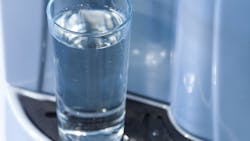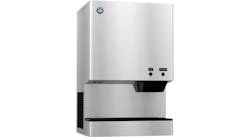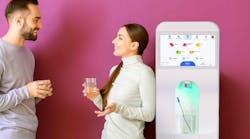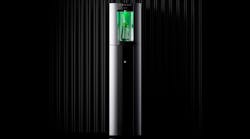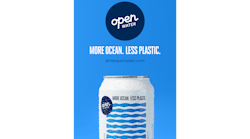Water solutions for office coffee service and micro markets
When it comes to water solutions in the workplace, there are many innovations and offerings available today. Manufacturers have stepped up to the plate – with products that hit a number of consumer preferences. When providing a water solution to a location, operators need to consider options that are focused on environmental impact, hygiene concerns and beverage customizations for the user.
Make room for sustainability
Environmentally focused and sustainable products are a key concern for workers in the office. A study from First Insight found 75% of Generation Z survey participants prefer sustainability over the brand name of a product when making purchase decisions. But it’s not just the younger generation; in the same survey, the majority of respondents across every generation continue to consider sustainable packaging as important. To appeal to those customers, operators can look at alternatives to bottled water.Sustainability also goes beyond packaging. Borg & Overstrom, a water dispenser manufacturer based in the U.K., created its eco mode feature to save energy. Eco mode is a design feature that will place the water system into a sleep mode when it detects inactivity for longer than two hours, or 6.5 minutes of darkness. The feature is available on the company’s B6, T2 and T3 models.
“Employees, most notably the younger workforce, are seeking organizations that hold social values at the forefront, particularly sustainability,” said John Whalen, senior vice president of sales, marketing and customer service at Quench, which offers a full line of water coolers, ice machines, sparkling water dispensers and coffee brewers. In fact, Whalen noted that switching to a Quench bottleless water cooler allows organizations and businesses to keep 7,000 single-serve plastic water bottles out of the waste stream. Whalen said that workplaces which offer Quench filtered water, chewable ice or flavored sparkling water to their employees often also save up to 80% versus bottle delivery while reducing their organization’s use of plastic. “Replacing one 5-gallon water jug cooler with a bottleless water cooler can reduce an organization’s CO2 emissions by 53% by keeping 150 5-gallon water jugs out of the waste stream,” he continued. Customers are becoming increasingly concerned with their environmental impact, and operators need to be able to offer solutions that address those concerns.
Hands-free solutions
Beyond sustainability, hygiene concerns brought on by the pandemic have led to more interest in touchless offerings. “Touchless dispensing continues to be a key feature for many decision-makers, particularly in industries that continued to operate during the COVID-19 pandemic – manufacturing, distribution and healthcare,” said Whalen of Quench. Now that many workers are back in the office either in a hybrid or full-time role, they may likely be more aware of germs in high-use areas, including water dispensers and ice machines.
Although touchless machines may not be a perfect fit for every location, water service providers should have a clear understanding of the hands-free options available, whether it is a product with a foot switch panel or mobile app.
Water how they want it
There are several growing trends when it comes to water itself, but one of the most notable is the customer’s desire for customization. Whether they want hot, cold, sparkling, flavored, enhanced – users have the ability to make a drink of water more than just a drink of water; they can transform it into a specialty beverage. This trend is seen throughout the beverage industry. According to the latest research by InsightAce Analytic, the global sparkling water market is valued at $29.3 billion in 2021, and it is expected to reach $67.6 billion in 2030. The report found that, “The growing demand for sparkling water over sodas and other sweetened fizzy beverages is anticipated to propel the market growth during the forecast period. Moreover, factors such as increasing health-conscious people, changing lifestyles and high preference for safe and healthy products are expected to create lucrative growth opportunities for this market.” Operators have an opportunity to gain a competitive edge by offering water as a specialty perk, especially, as the report notes, there is growing demand for sparkling water over sodas.
Quench is not the only company answering the call. Launched several years ago, Massachusetts-based Bevi offers its Standup 2.0 smart water cooler with many amenities consumers are asking for. Users can choose between filtered still water or sparkling water in addition to choosing between cold, ambient or hot temperatures. This gives consumers the option of making drinks in a range from hot tea to cold sparkling water.
The Bevi Standup 2.0 smart water cooler also gives users the ability to add in water enhancements, such as caffeine, and the machine allows two enhancements per drink. It also offers 12 natural flavors for users to choose from, allowing them to mix up to three different flavors at once.Technology in water
Although water may seem to be a steady, uninterrupted market, it is actually rife with innovation. At this year’s CES — a leading technology event where thousands of exhibitors showcase the latest technologies from artificial intelligence to cybersecurity and even water – Kara Water introduced the world’s first air-to-water dispenser, the Kara Pure. It produces up to 10 liters of water per day, all from air. Although the product is designed for at-home use, it is just the first of many innovations showcasing what’s possible in the world of water. Perhaps in years to come, this technology will work in offices.
For now, Easy Ice CMO Ryan Kelly says that remote monitoring on ice equipment is an up-and-coming trend. “This is fledgling technology at the moment, but Easy Ice expects it to take off quickly once the bugs have been worked out, as it will create greater transparency for business owners around their ice machine’s condition and help us reduce ice machine downtime through preemptive problem solving.”
2023 and beyond
Despite the ongoing labor and supply chain challenges that operators face, there are many reasons to be excited about water solutions in 2023. In fact, Automatic Merchandiser’s 2021 State of the Industry Report found consistency in water service share of sales over the last three years. Numerous offerings will appeal to a range of customers, from the type of water to the way in which it is dispensed. With the right product, water service can be another way for operators to grow their sales. ■

Adrienne Klein | Contributing Editor
Adrienne Zimmer Klein is a freelance writer with a background in the vending, micro market and office coffee service industry. She worked as an associate editor and managing editor at Automatic Merchandiser and VendingMarketWatch.com from 2013 until 2017. She is a regular contributing writer at Automatic Merchandiser.
